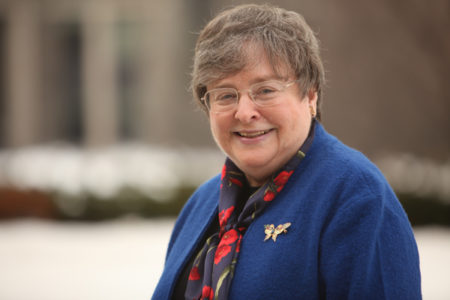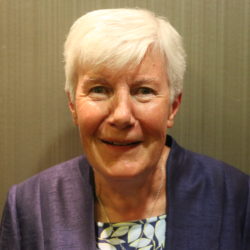When I studied at Saint John’s University in Queen’s New York from 1989 to 199I I lived with a community of the Sisters of Saint Joseph of Brooklyn . There were fifty Sisters in the community then and their primary apostolate was teaching in the High School attached to the convent. They spoke with pride and admiration about one of their Sisters, Elizabeth Johnson who, like the majority of Sisters in the community was Irish American. I have followed Elizabeth’s career over the past thirty years and had the privilege of meeting her when she gave a lecture in Maynooth in 2016. She is now one of the most significant theologians in the English-speaking world and is a former president of the Catholic Theological Society of America. She has written numerous books and articles and has lectured widely. I don’t claim to have read all her books but I have been blessed to have read some of her publications.
 St. John’s University, Queens, New York
St. John’s University, Queens, New York
In one of her earliest books “Women, Earth. And Creator Spirit” (1992) Elizabeth introduces the topics of her subsequent writings namely, the planet crisis, patriarchy, the role of women in Church and society, the neglect of the Holy Spirit especially in western theology and an awareness of interconnectedness. In six short chapters Elizabeth describes in painful detail the deterioration of life on earth, sea and air resulting from a mind-set that believes that our planet was created for the sole use and benefit of our species. She illustrates that as a consequence of this mind-set patriarchy, hierarchy, dualism and the pyramid symbol became ingrained in all cultures and of course were adopted by all major religions. Values which ran counter to interconnectedness, such as competition and individualism were valued and nurtured. In all this process women were considered inferior to men intellectually and physically and were therefore denied justice with painful consequences.
I read “She Who Is – The Mystery of God in Feminist Theological Discourse” in 1994 and to say that it was a watershed event in my life is an understatement. I particularly like her quotation from Saint Thomas Aquinas “If I tell you I know Who God is then what I know is not God “ and the quotation from Scripture “You forgot the God who gave you birth” (Deut.32:18). There is also an illustration in the book of the creation of Adam in the Sistine Chapel. We now know that the fresco is a precious artistic creation but portrays very poor theology. In this book, in a measured and theological discourse Elizabeth traces the origins, developments and effects of a less than authentic image of God on theology. However, despite all the advances in both society and in the Church on the importance of using inclusive language our liturgies are still in patriarchal terms. We are blessed that the Sisters who wrote “Morning and Evening Prayer of the Sisters of Mercy” used the New Revised Standard Version Bible. As a further comment I would like to point out that Elizabeth’s theology is beautifully reflected in many of the intercessions and concluding prayers in our “Morning and Evening Prayer” book. (Ex. Jesus, you promised that whatever we ask for in your name will be granted. Confident in this promise, we pray for the needs of our earth and of all who share it as their home. Evening Prayer week 4)
 Elizabeth A. Johnson
Elizabeth A. Johnson
We read “Ask the Beasts: Darwin and the God of Love” (2014) by Elizabeth in our book club at An Tairseach centre in the Dominican Convent, Wicklow, which is a difficult read but with the support of the group we persevered and even enjoyed it. It is a difficult book especially for one who hasn’t a background in biology, however, I now know that the theory of evolution is no longer considered merely a theory but is accepted in official Church teaching as a proven scientific fact. The group discussion helped me appreciate the presence of the Divine in and through creation and the essential role of every single species. The opposite of this insight is the anthropocentrism of our culture, that values human beings exclusively and ignores all non-human contributions to the current state of evolution and human awareness. Despite stories in the Gospels about the ‘birds of the air ‘and our awareness of the emphasis Jesus placed on non-human species Elizabeth claims we have not learned to create an inclusive prayer pattern. In fact, I now see that the greetings and doxologies in our “Morning and Evening Prayer” need to be edited. For example “Let our prayer rise before you, God of all peoples and nations “can be changed to “………God of Creation” And “Glory to you, God of all peoples” could read : “….. God of all Creation”.
Between 1992 and 2018 Elizabeth Johnson created a significant oeuvre of books, lectures and published articles on the above aspects of theology. She has contributed significantly to developing our understanding of an authentic response to a God who bestows unconditional love on all Creation. I look forward to reading her latest book, “Creation and the Cross, The Mercy of God for a Planet in Peril” (2018) in our Tairseach book club.
I would love if all of you read some of Elizabeth’s writings; I have found them both educational and enjoyable.
Mary Fagan rsm
South Central Province


